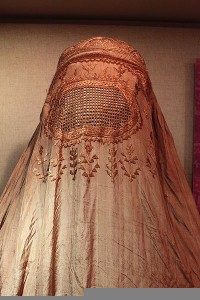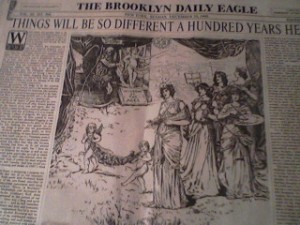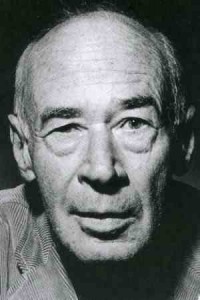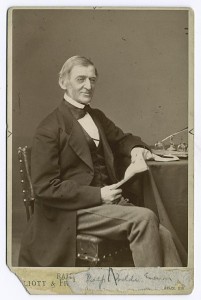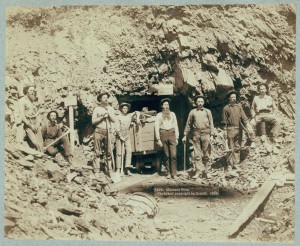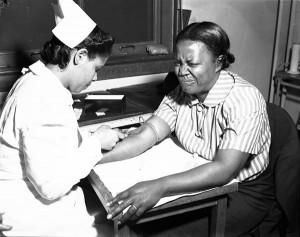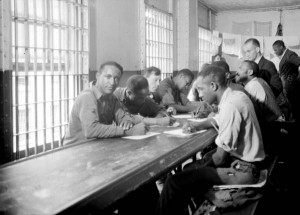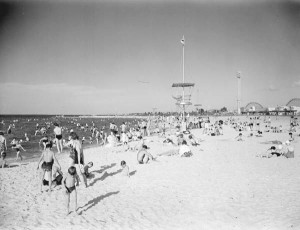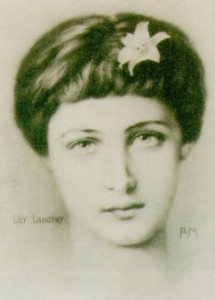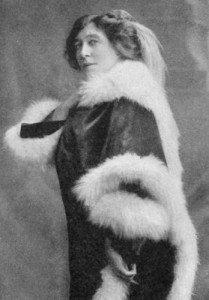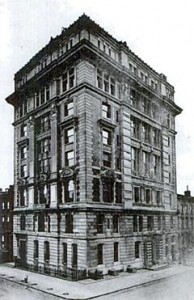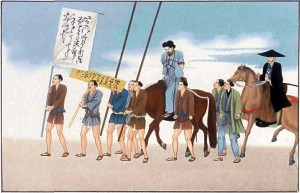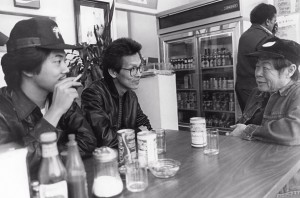
"...to answer to the charge of sending an improper note in a bouquet of roses to Miss Edith Hall..." (Image by Jebulon.)
Either there is more than meets the eye to this story in the July 6, 1897 edition of the Brooklyn Daily Eagle, or everyone in the area temporarily lost their minds. The story is about a young dandy who became enamored with a lovely burlesque performer and tried to make her acquaintance. Then everything went haywire. An excerpt:
“Maurice Butler, a well-groomed and stylishly dressed youth 16 years of age was in the Grant street court this morning, accompanied by his father, Dr. William Butler of 507 Clinton avenue, to answer to the charge of sending an improper note in a bouquet of roses to Miss Edith Hall of 428 West Thirty-fifth street, New York, an actress at Bergen Beach, last night. The youth, when taken before Justice Steers to plead, said that he was guilty of the offense charged, but afterward, by advice of his father, withdrew the plea and the case was then adjourned until Thursday next. Dr. Butler signed the bail bond of $500. If young Butler desires to sow his wild oats and lead a gay life he is not likely to repeat his adventure of last night at the popular short resort. He said it was his first attempt to flirt with an actress and it would, he declared, be his last.
Young Butler, who was at one time a student in the Polytechnic Institute, went to the Casino at Bergen Beach last night to see Little Miss Brooklyn, the burlesque show in which Miss Hall appears as Miss Brooklyn. He had visited the place several times before and had become infatuated with Miss Hall, who wears white tights and is graceful and pretty. The young man carried a large bouquet of Jack roses in which, appeared later, was hidden a note requesting her to meet him after the show. Butler watched the performance with much interest and did not fail to applaud loudly when Miss Hall appeared on stage. Before the third act came to a close Mr. Butler sent the flowers to Miss Hall and awaited results. In the note alleged to have been written by him was a request that if the actress would meet him as desired she would wear the flowers when she next appeared on stage.

Not Edith Hall, but a fine representation of the old-timey burleque entertainer. (Image by trialsanderrors.)
When Miss Hall received the roses and discovered the note and the message therein she was quite overcome, but was not long in making her way to Percy G. Williams, the manager of the beach. She showed him the bouquet and the message and asked how to proceed in order to locate the writer. Mr. Williams called his son and asked if he could point out the person who had sent the bouquet, and when he learned that he told Miss Hall to go on with her part and not to fail to wear the flowers, as requested by the sender. She did so.
As soon as Miss Hall left the place she was approached by Mr. Butler, who raised his hat and greeted her pleasantly. The actress asked the youth if he had sent the bouquet and the note attached, and when he replied in the affirmative she invited him to walk toward the swimming pool. The couple had barely reached the swimming pool when Mr. Butler was torn from her side by a crowd of men, which he said this morning, he thought numbered fully one hundred, and was thrown into the pool. He was soused up and down for several minutes until Detective Betts of the Twenty-third Precinct appeared on the scene, and the crowd dispersed. He was assisted to the walk, his clothes soaked. Miss Hall promptly charged him with insulting her and he was treated to a ride to the Flatbush station house where he was locked up. That was at midnight.
Miss Hall was in court this morning to press charges against Mr. Butler. ‘When I left the Casino last night, I did so expecting to horsewhip that boy, but I did not get a chance. I did not know the men expected to give the boy a bath, and my only object in meeting him was to give him a whipping.'”
More Old Print Articles:
- Actress Lillie Langtry uses cocaine. (1889)
- Drunken Englishman starts fight with a pig in Brooklyn. (1885)
- Carrie Nation arrested on Coney Island. (1901)
- Pig “actors” escape from Brooklyn theater. (1902)
- Cobbler tormented by pranksters. (1885)
- British fishermen kill a merman. (1896)
- Hobos steal fine clothes from decent folk. (1895)
- General Robert E. Lee kisses pretty girls. (1891)
- Monkey trained to steal jewelry. (1895)
- Brooklyn tailor tears out rival’s whiskers. (1898)
- Public baths required for Brooklyn filthbags. (1897)
- Judge orders monkey arrested. (1882)
- Silent film legend John Bunny is remembered in Brooklyn. (1915)
- Artist John Frankenstein perishes in Brooklyn. (1881)
- Four-year-old artistic genius in San Francisco. (1896)
- Brooklyn woman paints her own house, everybody freaks. (1900)
- Profile of an old-time clown. (1896)
- Performing bears at Bay Shore. (1895)
- Circus Freak gets indigestion after swallowing metal objects. (1904)
- Hairy woman thrown through barbershop window, uninjured. (1897)
- Hunchback paramour has throat cut. (1877)
- Inflated a boy with air. (1900)
- Prisoner gives evil eye to jailer. (1900)
- Three-card monte man passes away. (1878)
- Monkey rides bicycle. (1897)
- Bears brawl in Central Park. (1902)
- Umbrella duels. (1895)
- Boiling eggs with electricity. (1890)
- Billy goat guards recluse. (1900)
- Kissing bandit captured. (1892)
- A maniac gymnast. (1877)
- Brooklyn judge encounters sea monsters in his bathroom. (1902)
- Man finds severed human head, throws head back into creek. (1897)
- Brooklyn geezer tries to shoot noisy dogs. (1896)
- Hoaxer pretends to go over Niagara Falls in a barrel. (1889)
- Manhattan madman goes on rampage. (1890)
- Fisticuffs at a male beauty pageant. (1893)
- Tough girl breaks detective’s nose. (1898)
- George Francis Train loses his mind. (1888)
- Organ grinder has monkey kidnapped. (1899)
- Human vampire behaves poorly. (1892)

